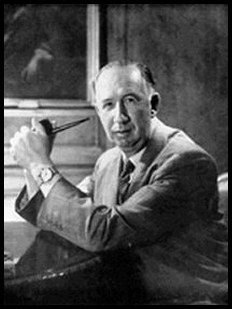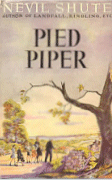When Nevil Shute Norway died in 1960, he was very much missed by a few loyal Shutists. Surprisingly his name did not figure in the list of classic writers of the mould of Charles Dickens, Leo Tolstoy, Alexandre Dumas, Walter Scott, Mark Twain, Robert Louis Stevenson, etc. for the literate public to take note. While his works were mainly based on his own experience in aviation, and of course, the connected wars, there has been a consistent human thread that wove all his characters into a garland, that still gives his readers immense satisfaction of enduring fragrance. There is hardly a Nevil Shute fan who has not read each of his novels many number of times - not for enjoying the turn of phrase alone, but for the sheer repeated readability.
Maybe, one of his works that catapulted him to fame, "ON THE BEACH" had a pathos that few would prefer to re-experience. It is still a masterpiece that makes one sit up and think. His other book, "A TOWN LIKE ALICE" is one, while being a romantic thriller, that could be a "Mills and Boon" novel, has such deep message of positive thinking in the face of adversity, that when one finishes reading the novel, a sense of achievement, not much lesser than the heroine of the novel had, would have been felt. He takes us all into the situations like a tourist guide, when a picture forms in the mind, and if readers happen to have a gift of drawing, each location drawn, I am sure would be identical, since the descriptions are so authentic. "CHEQUER BOARD" takes one across, first into Burma (presently Myanmar), where the reader would enjoy the trip on Irrawaddy, and be one with Philip Morgan, one of the characters, that puts on rails a disused steam locomotive engine. The story-telling shifting to England when a Negro contingent comes there, as a part of lease-lend agreement, to create an aerodrome, is perhaps unparalleled, and perhaps would be loved by any coloured gentleman from America or say anywhere in the world, wherever there is apartheid. Every situation he creates has logic and cannot be wished away as fiction.
Of course, as many writers are, he was an idealist and wanted the earth to be a heaven. He tried to read into the future. Being from England, he had a fathomless affection for the Queen and Commonwealth, and tried to glorify it in his own inimitable style. His insight into other religions beyond Christianity, and not only his tolerance, but his ability to bring out the best in them, was shown in "IN THE WET" (Buddhism), "A TOWN LIKE ALICE" and "ROUND THE BEND"(Muslim), by appropriate references.
"PIED PIPER" is one of his works that would appeal to any reader. An old Englishman, grieving the loss of his only son in the war, comes to Switzerland to forget the pain, at least temporarily, but was caught in the cross fire of German invasion of France. When he was on his return trip, he was requested to take charge of two English children and escort them to England. While on this job, his charges keep on adding and ultimately how he succeeded in leading a pack of children of various nationalities, surprisingly, one of them, even a German girl, to safety in America, makes thrilling reading, again with all clarity, reasoning and of human nature in its glory.
The darker side of war, and its effect on public was painted in very disturbing, but absolutely plausible situations, in his novels "WHAT HAPPENED TO THE CORBETTS", and "REQUIEM FOR A WREN". (Wren is a term, few of the present generation is familiar with, and equal is the other term "Requiem"). Despite the highly technical aspects of the novels, character delineation is so down-to-earth, that one could identify them with the person next door. While generally readers like happy-ever-after endings to any book they read, some of his important works have sorry endings, but they all leave the readers, so much engrossed, during the unfolding of the tale, that make people feel, perhaps the ending was fair.
His autobiographical work, "SLIDE RULE" gives a rare insight into the working (Or should we say non-working) of government, and his personal views on bureaucracy and politicians. His scathing remarks on political interference in technical matters, leave one with no choice, except to develop an utter loathing of those classes. To make democracy more meaningful, his suggestion, in "IN THE WET" about multiple votes, to give a much better say in matters of election by discerning voters by having more votes, is perhaps worth a trial.
"TRUSTEE FROM THE TOOL ROOM", and "NO HIGHWAY", have persistence to achieve any objective as the sole theme. His belief in supernatural, runs in many works, but nowhere, it was poo-poohed away, as mumbo-jumbo. Planchette, Pyramidology , animals standing motionless foretelling imminent death - all these are given their rightful place - again in a logical manner. His belief in re-birth transcends religion , as depicted so graphically in "AN OLD CAPTIVITY".
Some secrets of war, notably of the invasion of France by allies, might have been divulged, in "MOST SECRET", but make excellent reading, as good as any war thriller. Attention to detail, characters which have only a brief role, but so important, mundane matters, which many a popular writer just glosses over, have been the speciality of Nevil Shute.
One of the recurrent themes he deals with is perfection, in maintenance of Aircraft. While this was made into religion, with many followers, in his book "ROUND THE BEND", it crops up in other novels, "AN OLD CAPTIVITY", "NOHIGHWAY". This penchant for perfection, is repeated in all walks of life, with which he dealth. Be it a professional trusty, as in "A TOWN LIKE ALICE", or for an orphaned niece in "NO HIGHWAY", or Doctor Hughes, dealing with an old army injury, as in "CHEQUER BOARD" or the banker Warren, in "RUINED CITY", his characters have a fundamental honesty to their vocation.
If after all these years, some people join in their eulogy to Nevil Shute, paid in the form of seminars, meetings, references and most important, forming fan clubs, to exchange information, make him come alive. My only unfulfilled wish is for the new generation to take to him, and put him on the pedestal he deserves.
By Gadepalli Subrahmanyam
March 2011


